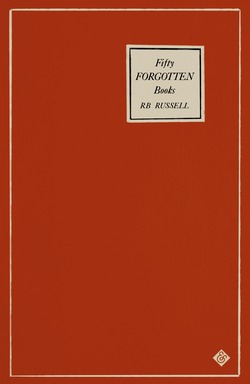Fifty Forgotten Books (2022) by R.B. Russell is as enjoyable as browsing in a dusty old book shop on a rainy day. Much of the book mirrors that experience, as Russell, the protagonist, takes us back to these long gone places through a series of books that have shaped his literary lifetime, often verging on bibliomania. Along the way, it’s not just the places that are fondly recalled, but the idiosyncratic booksellers and collectors he befriended, each happy to slip a book into the author’s hand.
As he states in his introduction, the list provided here is “a personal recommendation of often overlooked and unloved novels, short story collections, poetry and non-fiction”, and they come not with concise summaries, but instead explore the value of the books, whether that be for their rarity, the literary history behind them, or purely sentimental reasons. Depending on who you are, some of these books have never been forgotten or maybe they’ve never been known about to forget, but most fall into “the less frequented byways of literature”.
For the most part, these byways are in the literary supernatural, which is not unexpected as Russell, along with his partner, Rosalie Parker, runs Tartarus Press, boutique publisher of such. Here he recalls the first meeting, in print, with Arthur Machen, hoping for existentialism in The Hill of Dreams (1907) and finding something greater. Tartarus would later publish plenty of Machen’s work, and along the way other writers like Robert Aickman (Russell is also his biographer), Denton Welch, and Sarban, the pen name of British diplomat, John William Wall, all of whom are represented.
While each chapter is dedicated to a specific book, they tend to follow the pattern of first discussing the work and its meaning to Russell then honing in on a slice of his life. Thus the book becomes a memoir just as much as it is a healthy helping of suggestions, showing the writer as a renaissance man, where the books he’s loved have led him, in addition to publishing, into writing fiction, translation, and musical composition. This life is intertwined with the books. The author happily talks of old publishers, first editions, author societies and dinners, and befriending other avid collectors and, in the case of Machen, his daughter, Janet.
Personally I’ve only read two of the books here – The Devil in the Flesh (1923) by Raymond Radiguet and The Tenant (1964) by Roland Topor – though I have copies of several more. It’s not a list for completists, as some of these are more than a little out of reach to the casual buyer. But each recommendation is invariably dripping with other titles to explore. There are a few Tartarus books, which may be seen as self-serving, but they clearly mean something to the author and nobody’s getting rich off limited edition hardbacks that sold out years ago.
Though a memoir, there’s practically a subplot running through the book as the character of Noel Brookes, a Brighton bookseller rumoured to be a spy, pops up in Russell’s journey. Other people mentioned, some known from their own artistic endeavours, like Mark Valentine and David Tibet, add pleasing texture. However, the occasional name drop of someone previously unannounced who will, most likely be unknown to those not in Russell’s circle, is at times distracting.
As the works listed in Fifty Forgotten Books are recounted, it’s clear this is a tribute to the obscure and overlooked. There’s no denying that Russell is the epitome of bibliophilia. He doesn’t just read the works but delights in the world around them, the stories beyond them, the hunt for them in defiance of the internet, and the shared enthusiasm of those other travellers on the lonely byways. One may say that this book is an attempted rescue of such works.
